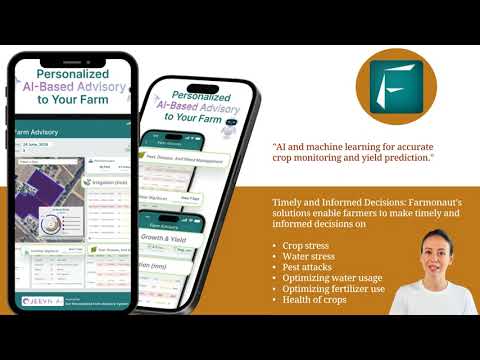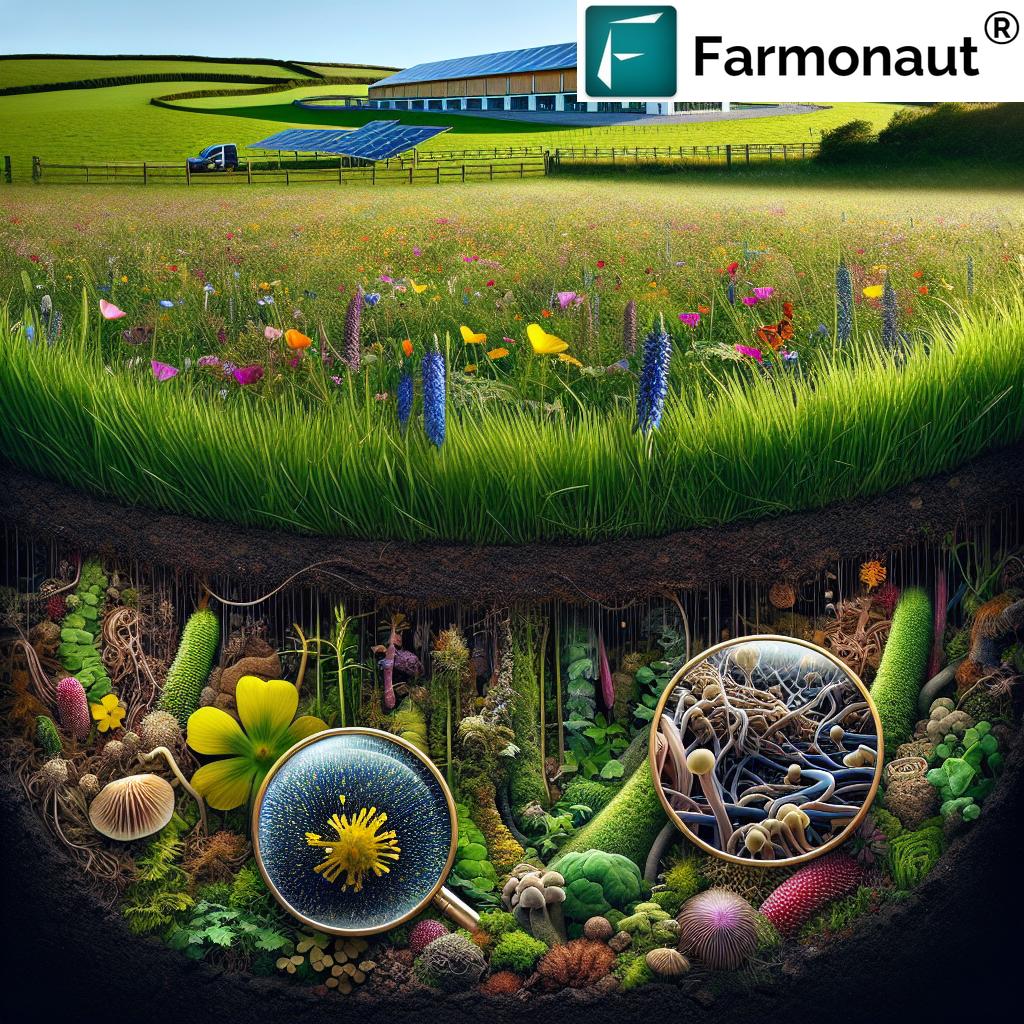Scottish Agricultural Policy Update: Pesticide Regulations and Enhanced Greening Scheme 2026
“Scotland’s Enhanced Greening scheme, launching in 2026, aims to revise permanent grassland guidance and modify Ecological Focus Areas.”
We, as representatives of Farmonaut and experts in the fields of agriculture, remote sensing, and GIS, are here to provide you with a comprehensive update on the recent developments in Scottish agricultural policy. The landscape of farming in Scotland is undergoing significant changes, particularly in the realms of pesticide regulations and environmental initiatives. In this blog post, we’ll delve into the key updates from the recent Pesticides Stakeholder Group (PSG) meeting and explore the implications of the upcoming Enhanced Greening Scheme set to launch in 2026.
Recent Developments in Scottish Pesticide Regulations
The minutes from the PSG meeting held on September 5, 2024, have been confirmed, shedding light on crucial regulatory changes affecting the agricultural sector. Let’s break down the key points:
- Forestry Crop Classification: The Scottish Government (SG) officials are set to follow up with Confor via email regarding forestry crop classification, demonstrating ongoing engagement with industry stakeholders.
- Flonicamid Review: The Health and Safety Executive (HSE) has published a further review of Flonicamid, which remains approved for use in Scottish agriculture.
- Emergency Authorizations: Two significant emergency authorizations have been issued for pesticide treatments:
- Apron XL: A seed treatment using metalaxyl-M for parsnips to combat damping off.
- Force ST: Utilizing tefluthrin as a seed treatment for bulb onions and shallots to manage bean seed fly.
These emergency authorizations highlight the ongoing efforts to address immediate crop protection needs while maintaining regulatory oversight.
The Metribuzin Dilemma: EU Decision and Its Implications
“The EU’s decision not to renew metribuzin approval affects broadacre crops like potatoes and vegetables in Scotland.”
A significant point of discussion during the PSG meeting was the European Union’s recent decision not to renew the approval of the herbicide metribuzin. While this decision doesn’t directly affect Great Britain, it signals potential future implications when metribuzin comes up for review in GB. The importance of this herbicide for Scottish agriculture cannot be overstated, particularly for broadacre crops such as:
- Potatoes
- Blackcurrants
- Carrots
- Various vegetables
Representatives from the soft fruit sector noted that while their blueberry operations weren’t heavily impacted, metribuzin remains crucial for blackcurrant crops, as evidenced by recent surveys. This situation underscores the need for continued industry engagement and proactive planning to address potential changes in herbicide availability.

The Agricultural Reform Program (ARP) and Enhanced Greening Scheme
The PSG meeting also shed light on the developments within the Agricultural Reform Program, specifically focusing on the Enhanced Greening scheme set to launch in 2026. This initiative aims to strike a balance between supporting farmers through necessary policy adjustments and enhancing the environmental contributions of the agricultural sector.
Key focal points for Tier II of the Enhanced Greening scheme include:
- Revising guidance on permanent grassland to better align with Scottish conditions
- Modifying exemptions rules to boost population contributions
- Updating existing Ecological Focus Areas (EFAs) to enhance policy benefits
- Adding new EFA options for increased farmer flexibility and improved policy outcomes
- Reevaluating the current EFA percentage rate, which stands at 5%
These proposed changes reflect a comprehensive approach to agricultural policy reform, aiming to create a more sustainable and environmentally conscious farming landscape in Scotland.
Stakeholder Engagement and Future Directions
The discussions following the ARP presentation emphasized the critical need for continuous stakeholder engagement in shaping these developments. As a result, an action item was created for an ARP team representative to attend a future PSG meeting, ensuring ongoing dialogue and collaboration between policymakers and industry stakeholders.
This commitment to stakeholder engagement is crucial for developing effective and practical agricultural policies that address both environmental concerns and the needs of Scottish farmers.
Comparative Analysis of Scottish Agricultural Policy Changes
| Policy Area | Current Status | 2026 Proposed Changes |
|---|---|---|
| Pesticide Regulations | Metribuzin approved; emergency authorizations in place | Potential changes based on GB review of metribuzin; ongoing evaluation of emergency authorizations |
| Permanent Grassland Guidance | Existing guidelines | Revision to better align with Scottish conditions |
| Ecological Focus Areas (EFAs) | Current EFA options | Update existing EFAs; introduce new options for increased flexibility |
| EFA Percentage Rates | 5% | Reevaluation of percentage rate |
| Seed Treatments | Emergency authorizations for specific treatments | Ongoing assessment and potential adjustments based on crop protection needs |
As we navigate these changes, it’s crucial for farmers and agricultural businesses to stay informed and adapt their strategies accordingly. This is where Farmonaut’s expertise in remote sensing and GIS can prove invaluable.
Farmonaut’s satellite-based farm management solutions can help farmers optimize their crop management practices in line with new regulations and environmental goals. Our advanced technologies, including real-time crop health monitoring and AI-based advisory systems, enable farmers to make data-driven decisions that align with evolving policy requirements.
For developers and businesses looking to integrate cutting-edge agricultural data into their systems, Farmonaut offers comprehensive API solutions. Our API Developer Docs provide all the information needed to leverage our satellite and weather data effectively.
Implications for Scottish Farmers and Agribusinesses
The upcoming changes in pesticide regulations and the Enhanced Greening Scheme will have far-reaching implications for Scottish agriculture. Here’s what farmers and agribusinesses should consider:
- Crop Protection Strategies: With potential changes to metribuzin approval and ongoing evaluations of emergency authorizations, farmers may need to reassess their crop protection strategies, particularly for broadacre crops like potatoes and vegetables.
- Environmental Compliance: The Enhanced Greening Scheme’s focus on Ecological Focus Areas and permanent grassland management will require farmers to adapt their land use practices to meet new environmental standards.
- Resource Management: Changes in EFA percentage rates and options may necessitate a reevaluation of how farm resources are allocated to meet both production and environmental goals.
- Technological Adoption: To navigate these changes effectively, farmers may benefit from adopting precision agriculture technologies that enable more efficient and environmentally friendly farming practices.

The Role of Technology in Adapting to Policy Changes
As the agricultural landscape evolves, technology plays a crucial role in helping farmers adapt to new regulations while maintaining productivity. Farmonaut’s suite of tools is designed to address these challenges:
- Satellite-Based Crop Health Monitoring: Our advanced monitoring system helps farmers optimize pesticide and fertilizer use, aligning with evolving regulations and environmental goals.
- AI-Driven Advisory System: Farmonaut’s Jeevn AI provides personalized recommendations that take into account both crop needs and regulatory requirements.
- Resource Management Tools: Our platform offers solutions for efficient resource allocation, helping farmers meet EFA requirements while maximizing productivity.
- Carbon Footprint Tracking: As environmental considerations become increasingly important, our carbon footprinting feature enables farmers to monitor and reduce their environmental impact.
To access these powerful tools and start optimizing your farming practices, download our mobile apps:
The Future of Scottish Agriculture: Balancing Productivity and Sustainability
As we look towards 2026 and beyond, the Scottish agricultural sector faces both challenges and opportunities. The Enhanced Greening Scheme and evolving pesticide regulations reflect a broader shift towards more sustainable farming practices. However, this transition also presents opportunities for innovation and growth.
Key areas of focus for the future include:
- Integrated Pest Management (IPM): With potential restrictions on certain pesticides, developing robust IPM strategies will be crucial for maintaining crop health and yields.
- Soil Health Management: The emphasis on permanent grassland and EFAs highlights the importance of soil conservation and improvement practices.
- Precision Agriculture: Adopting technologies that enable precise application of inputs and targeted crop management will help farmers meet both production and environmental goals.
- Biodiversity Enhancement: The focus on EFAs provides an opportunity to integrate biodiversity-enhancing practices into farm management, potentially opening up new revenue streams through ecosystem services.
Farmonaut is committed to supporting Scottish farmers through these transitions. Our platform continues to evolve, incorporating the latest advancements in remote sensing and artificial intelligence to provide farmers with the tools they need to thrive in this changing landscape.
Engaging with Policy Development
The PSG meeting highlighted the importance of stakeholder engagement in shaping agricultural policies. We encourage Scottish farmers and agribusinesses to:
- Stay informed about upcoming policy changes and consultations
- Participate in industry forums and discussions
- Provide feedback on proposed changes through official channels
- Collaborate with research institutions and technology providers to develop innovative solutions
By actively engaging in the policy development process, the agricultural community can help ensure that future regulations are practical, effective, and supportive of both environmental and economic goals.
Farmonaut: Your Partner in Navigating Agricultural Change
As the Scottish agricultural sector adapts to new policies and environmental requirements, Farmonaut stands ready to support farmers and agribusinesses with cutting-edge technology and data-driven insights. Our platform is designed to help you:
- Optimize crop management practices in line with new regulations
- Improve resource efficiency and reduce environmental impact
- Make informed decisions based on real-time data and expert analysis
- Stay ahead of industry trends and regulatory changes
Earn With Farmonaut: Join our affiliate program and help fellow farmers while growing your income! Earn 20% recurring commission by sharing your promo code, helping farmers save 10%. Onboard 10 Elite farmers monthly to earn a minimum of $148,000 annually—start now and grow your income!
To learn more about our affiliate program and start earning, visit Earn With Farmonaut.
Conclusion
The Scottish agricultural sector is on the cusp of significant changes, with new pesticide regulations and the Enhanced Greening Scheme set to reshape farming practices in the coming years. By staying informed, engaging with policymakers, and leveraging advanced technologies, farmers and agribusinesses can not only adapt to these changes but thrive in the evolving agricultural landscape.
Farmonaut is committed to supporting this transition, providing the tools and insights needed to navigate the complexities of modern agriculture. Together, we can build a more sustainable, productive, and resilient agricultural sector in Scotland.
FAQs
- Q: How will the EU’s decision on metribuzin affect Scottish farmers?
A: While the EU decision doesn’t directly impact Great Britain, it signals potential future changes when metribuzin is reviewed in GB. Scottish farmers, especially those growing potatoes, blackcurrants, and vegetables, should stay informed and consider alternative crop protection strategies. - Q: What is the Enhanced Greening Scheme, and when will it be implemented?
A: The Enhanced Greening Scheme is part of Scotland’s Agricultural Reform Program, set to launch in 2026. It aims to revise permanent grassland guidance, modify Ecological Focus Areas, and balance environmental contributions with farmer support. - Q: How can farmers prepare for the upcoming changes in pesticide regulations?
A: Farmers can prepare by staying informed about regulatory updates, exploring integrated pest management strategies, and considering the adoption of precision agriculture technologies to optimize pesticide use. - Q: What are Ecological Focus Areas (EFAs), and why are they important?
A: EFAs are areas on agricultural land dedicated to enhancing biodiversity and environmental benefits. They’re important because they contribute to sustainable farming practices and are a key component of the Enhanced Greening Scheme. - Q: How can Farmonaut’s technology help farmers adapt to these policy changes?
A: Farmonaut’s satellite-based crop monitoring, AI-driven advisory system, and resource management tools can help farmers optimize their practices in line with new regulations, improve efficiency, and reduce environmental impact while maintaining productivity.



















